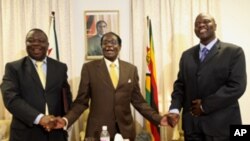Zimbabwe's Finance Minister Tendai Biti says the country's economy, battered by political uncertainty, policy inconsistencies and poor crop harvests, is now expected to grow only by 5.6 percent this year instead of the 9.4 percent he projected last December in his 2012 national budget.
Presenting his mid-term fiscal policy review statement in parliament Wednesday, Biti said the government has also revised downwards its revenue targets from $4 billion to $3.4 billion citing poor agricultural production and slow returns in the mining sector, especially diamond revenues.
He proposed a wide range of measures including an increase in excise duty on fuel and wheat imports noting that the country needs foreign direct investment to boost the economy as state revenues have stopped growing.
"Zimbabwe's desperate current account position as well as the budget deficit reflected in the huge domestic arrears that the government is accruing on a monthly basis is an indication that we are living beyond our means," said Biti, adding that "clearly we have to eat what we kill."
The finance minister said power shortages were also having a debilitating effect on the fragile economy.
On the contentious issue of indigenization and black economic empowerment, Biti told parliament that foreign investors who intend to invest in Zimbabwe will no longer be required to follow the 51 percent rule of local ownership. This, he said, is meant to boost investor confidence.
Harare-based economic analyst Davison Nkomo said there is nothing exciting about Biti’s fiscal review statement.
Independent economic commentator Walter Mbongolwane said government may fail to pay the current unsustainable wage bill and increase salaries of agitated civil servants this year.
“State funding for some social sectors will be cut due to diminishing revenues,” said Mbongolwane.
Zimbabwe was expected to generate $600 million this year from diamond sales but the country received only $41.6 million between January and June from companies mining in the controversial Marange field in Manicaland Province. It was supposed to net at least $123 million in the first quarter of the year.
The struggling nation registered a growth rate of 9.3 percent in 2011 following a decade of economic decay.





